- Home
- Jay Bonansinga
The Walking Dead: The Fall of the Governor: Part Two Page 12
The Walking Dead: The Fall of the Governor: Part Two Read online
Page 12
Lilly starts to say something else when she stops herself. She sees something in Austin’s expression change, his eyes welling up, and a single tear tracking down his face. The tear drips off his chin and falls to the floor. All the fight goes out of Lilly, and her guts tighten with sadness. She goes to him and puts her arms around him. He hugs her back, and then she hears Austin’s voice in her ear, barely a whisper, all strangled with sorrow. “I feel helpless,” he utters breathlessly. “Losing the baby … and now … I feel like you’re pulling away … and I can’t lose you … I can’t … I just can’t.”
She holds him and strokes his long hair and murmurs softly in his ear, “You’re not going to lose me. You’re my man. Do you understand? It’s you and me—end of story. You understand?”
“Yes…” His voice is barely audible. “I understand … thank you … thank you.”
For a long moment they hold each other in the ashen light of that cluttered living room, saying nothing, just holding each other as though bracing themselves. She can hear Austin’s heavy breaths in her ear, can feel his heart beating against her chest.
“I know what it’s like to feel helpless,” she says at last, looking into his eyes, their faces nearly touching, their breath mingling. “Not long ago I was the poster girl for helplessness. I was a train wreck. But somebody helped me, gave me confidence, taught me how to survive.”
Austin holds her tighter, and he whispers, “That’s what you’ve done for me, Lilly.”
She plants a soft, tender kiss on his forehead and pulls him into a tighter embrace. God help her, she loves him. She will fight for him, she will fight for their future, she will fight to the death. She cradles the back of his head, stroking his long hair, but all she can think about now is getting into the shit and exterminating each and every one of these fucking monsters who remain a threat.
* * *
At dusk that night, the Governor sits by himself in the empty bleachers of the speedway, the wind tossing litter across the deserted infield. The sky, heavy with toxic particulates, streaks with ribbons of gold and fuchsia as the sun dips below the clouds and dust devils swirl across the track on the bluster of the day’s end—all of it reflecting Philip Blake’s pensive mood.
A great military leader once called this time “the great inhalation before the storm,” and Philip feels a similar weight in the air. Sitting in the waning light, he marshals his energy and fantasizes about the glory of battle and the satisfaction of seeing that bitch who crippled him come apart at the seams like a blood-filled piñata. Philip’s mind percolates with the dark energy of war like an atomic particle accelerator—humming with rage—turning this magic-hour light into an unholy rite, a sacred invocation.
Then, almost as if conjured by his thoughts, a harbinger appears—a stocky figure in camo pants, boots, and army surplus jacket—materializing in the shadows of the speedway’s far portal.
Philip looks up.
Gabe trots across the infield, breathless from running, his portly face filled with urgency, eyes blazing with excitement. He sees Philip. He circles around the end of the stands, hopping over the iron cordons and climbing the bench seats until he approaches the Governor. “They said I’d find you here,” he says, hyperventilating, leaning over and putting his hands on his knees.
“Take it easy, Kemosabe,” the Governor says. “I hope you got good news for me.”
Gabe looks at him and nods. “We found it.”
The words seem to hang in the air for a moment, the expression on Philip’s face unreadable in the fading blue light. He stares. “Start talking.”
* * *
According to Gabe, when they heard the shots that day, they crept through the thick woods adjacent to the two-lane until they snuck up on a couple of chicks and some older dude in a clearing doing some target practice. Gabe and his men stayed out of sight, huddling behind the trees, watching from a distance, as the three unidentified folks took down a few biters, and then started dragging one of the bodies back toward a high fence in the distance.
At first, none of it made any sense, but when Gabe and the boys finally followed a path up a hill to get a better view from higher land—and they got a good glimpse of what lay beyond the fence, spreading across the neighboring patchwork of farm fields like a vast housing block that had simply dropped out of space—all the pieces fell together.
The place once known as the Meriwether County Correctional Facility stretches almost as far as the eye can see across the pastureland on the eastern edge of the county, a zigzagging network of gray-brick postwar buildings situated behind three layers of security fencing. Gabe realized instantly that the reason nobody in Woodbury had thought of this place is probably due to the fact that it had been defunded by the state of Georgia in the crash of ’87, and for years it had been off the radar, sitting out here in the rural hinterlands like a ghost ship. The only reason that Gabe’s memory was jogged by the sight of the place was the fact that Gabe’s cousin, Eddie, a drug dealer from Jacksonville, had been held here in the late ’90s pending his appeal. The state had taken to using the place as a glorified waiting room—technically, a jail for convicted felons—running it on a skeleton crew but essentially keeping it stocked and armed and locked and loaded.
For the most part, the property seemed fairly secure to Gabe—but not by any stretch of the imagination invulnerable. Inside the perimeter of razor wire and guard towers, the exercise yards and run-down basketball courts lay deserted, cleared long ago of any biters. And although the outer edges of the fences swarmed here and there with stray walkers—clusters of them drawn to the scent of the human inhabitants like bees drawn to honey—the soot-stained buildings looked relatively solid, with good bones, and stacks on the roof pitches pluming puffs of exhaust. Somebody must have gotten the generators and emergency apparatus up and running. The condition of the place suggested the potential for refrigeration, showers, air-conditioning, cafeterias stocked with food and supplies, amenities such as gyms and weight-training rooms and arcades—all of it just begging to be taken.
“They’ve got the fences,” Gabe explains now, standing on a metal bench only inches away from where the Governor sits intently listening. “And they seem to be letting the biters form a perimeter around those fences, maybe by accident—or maybe they’re smarter than we thought.” Gabe pauses to let this sink in.
“Go on,” the Governor says, not taking his eyes off the empty racetrack, thinking it over as the gathering darkness pulls a curtain down on the arena. “I’m listening.”
“The thing is,” Gabe says, his voice dropping an octave, getting taut and thick with anticipation. “There ain’t a whole lot of them, and they can’t have that many weapons.”
The Governor doesn’t say anything, just keeps gazing at the hazy shadows that are deepening at the edges of the track, his single visible eye narrowing.
“We watched them for hours, man,” Gabe goes on. “We hit them tomorrow and they go down like chumps. I’m telling you … they’d barely put up a fight—”
“No.”
The word pops like a firecracker in the gloom, and it has the effect of a splash of cold water on Gabe’s face. He does a double take. He looks down at the Governor, and he tilts his head with consternation.
The Governor stares at the night for a moment, and then gazes up at Gabe. “We wait.”
Anger and dismay flare inside the stocky man. “Goddamnit, Governor! After what they did to Bruce?! We need to take them down now!”
“Excuse me?” The Governor’s one good eye holds Gabe in its thrall for a moment, the tiny pinprick of light in the center of his iris reflecting the moon like a fuse that’s been lit. “After they escaped, their guard was up, probably for weeks. We couldn’t find them.” He pauses with the theatricality of a professor giving a lecture. “After Martinez betrayed them—and they butchered him—their guard was up again. Still, nothing from us.”
By this point, Gabe has begun to nod slowly, almost to himsel
f, finally getting it.
“Now they’ve raided our territory, killed some of our men,” the Governor goes on with that dark, glittering gaze locked onto Gabe. “They’ve got to be expecting us to follow them back. We wait. We wait for them to relax again. That way, they don’t expect it. They convince themselves they’re safe—that we’ve given up or we can’t find them.”
Gabe nods.
“That’s when we fucking strike,” the Governor says. “And if you want to be along for the ride and not a rotting piece of biter food, you’ll shut your goddamn mouth and get the fuck outta my sight.”
Gabe stands there for a moment, swallowing back the dismay and shame.
“NOW!”
The booming echo of the Governor’s voice carries over the empty stands.
* * *
The next day, the dynamic in Woodbury changes. Every man, woman, and child can feel it, but few can articulate the tension that looms sharklike beneath the surface of daily life—the way children are kept mostly indoors and quiet and occupied by coloring books or board games, or the way conversations among the adults become muted and hushed and urgent. Any trace of the gallows humor that once peppered the bitch sessions around the coffee urn at the Main Street diner now fade away completely, replaced by a grim sort of purpose to each exchange, each task, each anxious meeting.
Over the next week, Gabe and Lilly huddle with the town’s elders and explain what’s going on. In private meetings they prepare the heads of families and the strongest of the young adults—those who will be on the front line—for the coming assault on the prison. They delegate duties required to get the town on its war footing, and soon a kind of organic hierarchy emerges. If the Governor is the high command, then Lilly and Gabe become his generals, relaying orders to the rank and file, organizing the ragtag battalion of residents into a ferocious invasion force. Lilly becomes the self-appointed standard-bearer, turning the fear to righteous rage, spreading the word that this will be a just mission, the only way to protect the children of Woodbury.
The racetrack becomes the official command center, with stockpiles of matériel and ordnance gathered in the garages underneath the stadium and under rain tarps across the infield. The Governor’s inner sanctum is established high up in the press boxes, with maps of Meriwether County taped up onto the walls and across the surfaces of folding tables. Late at night, the one-armed warrior can be glimpsed pacing the press box, alone, silhouetted by the yellow light of bare bulbs, compulsively studying the twenty-three-mile distance between Woodbury and the prison—plotting the invasion with the intensity of Eisenhower planning the Allied attack on Anzio.
By the end of that week, Lilly has made an exhaustive inventory of the armaments at Woodbury’s disposal. They have twenty-seven crates of 7.62 and 5.56 rounds and enough magazines for a small army, as well as enough Kevlar to outfit half the adults. They have three .50 caliber machine guns and scores of rifles, of both the assault and the long-range sniper variety. They have enough fuel to convey at least a dozen vehicles—most of them from the Guard station—across the twenty-three miles of rural roads to the battlefront. They have six mine-resistant armored trucks, a couple of cargo vehicles, a personnel carrier, two Humvees, and a pair of big Buick four-door sedans that will do in a pinch.
Gabe spends the bulk of the second week getting the single Abrams M1 tank—discovered in mothballs at the Guard station—in working order. The armored tank features a remotely operated .50 caliber turret on top and a 105 mm cannon with forty-two rounds in the hull. Since the tank’s turbine engine runs on diesel, Gabe has to send two separate parties on fuel runs to nearby truck stops for the last drops of diesel available in the county.
By the end of that second week of waiting and girding and preparing, Lilly has completely shed her fears and finds herself sleeping soundly for the first time since the plague began. She has no dreams now, and she awakes every morning replenished, her spine tingling with anticipation for the fight. Even Austin is on board. He has been target shooting regularly and has gotten very handy with the sniper rifle. Lilly feels a strange tie binding her with Austin—not just the shared grief over the miscarriage, but also the galvanizing purpose of their mission, their common hunger for a better future. They have convinced themselves that this is the only way, and the collective resolve has drawn them closer together.
The following Tuesday night, after dusk has settled down on the town—almost three weeks after Gabe’s discovery of the prison—Lilly finishes loading the last of the high-capacity ammo magazines that are lined up on long tables in the corridor under the racetrack. She decides to head home … and she is just emerging from the west exit, stepping into the darkness of the speedway parking lot, when she hears a shuffling noise behind her—coming from the shadows of the portal—that raises her hackles and causes her to draw her Ruger and whirl around with the muzzle coming up instinctively in the general vicinity of the noise.
A voice out of the darkness: “Young lady walking around a bad neighborhood alone at night.” The slender male figure lurking in the shadows smokes a cigarette, the orange firefly of its tip the only thing visible. “It’s a recipe for disaster.”
“Who’s there?” Lilly holds her gun on the silhouette shrouded in the shadows. The husky voice sounds familiar, but she can’t be sure. “Identify yourself, please.…”
The Governor steps out of the shadows into the pool of yellow security light. “Good to see your reflexes are sound,” he says, tossing the cigarette.
“Jesus, you scared the shit outta me.” She holsters her gun and feels her neck muscles relaxing. “You shouldn’t surprise people around this place, not if you want to keep your head from being shot off.”
“Point well taken.” He smiles at her, the fingers of his surviving hand stroking his whiskers thoughtfully. He wears his new trademark fashion statement—the makeshift eye patch—along with his customary camo pants and hunting vest, the stump of his right arm swaddled in yellowing bandages. In the scant illumination, his single surviving eye shimmers. “I’ve been keeping tabs on you, Lilly.”
“Oh?”
“You’ve been whipping these people into shape, and I appreciate it.”
“We gotta be ready.”
“You got that right.” He tilts his good eye toward her, the iris glittering. “Especially since we’re gonna be riding just before dawn.”
She looks at him. “Tomorrow?”
“Yes, ma’am.” He holds her in the thrall of that single eye. “You’re the first one to know this … didn’t want to get everybody all bent outta shape too soon. I want to come in from the east with the rising sun—through the trees—goddamn trucks make a lot of noise, don’t want to tip anybody off. Pass the word for me, will ya?”
“Absolutely.” She gives him a nod, her guts going cold, her brain swimming with anticipation. “We’re ready, Governor. We’re with you a hundred and ten percent.”
“Yeah? Good.” He rubs his chin some more. “How about that hunka-hunka burning love of yours? He finally master that scope?”
“Austin? He’s good. He’s ready. We’re all ready. You want me to drive the lead truck?”
“You take the transport wagon. I’ll have Gabe take the lead in the armored rig on the way out. We’re gonna take it nice and slow.”
“Right.”
“The tank is fast—it tops out at fifty-some miles per hour—but we’re gonna take it nice and easy.”
“Got it.” She looks at him. “Where are you gonna ride?”
“On the way out? I’m gonna be in the back of your transport truck with the boys.”
“Okay.”
“I’ll be on the bitch box the whole way, staying in close contact with you and Gabe and Gus and Rudy. But when we get close, I want to pull everybody over, say a few words, get everybody ready to rock.”
“Makes sense.”
“When we’re ready to launch, I’m going to want to be riding on the tank.”
“Good.” Li
lly licks her lips. “Something I’ve been wondering about, though.”
“What’s that?”
“What about the people in the prison?”
He looks at her. “What about them?”
She shrugs. “What if they … you know … surrender? Wave the white flag or whatever?”
The Governor gazes out at the night. He pulls another cigarette from his vest and sparks it with his Zippo, a wreath of smoke curling around his head. “We’ll cross that bridge when we come to it,” he murmurs in a low, smoke-cured drawl. He looks at her. “You sure you’re ready?”
“Yeah … whaddaya mean? Yes, absolutely. Yes.”
“You’re feeling okay?”
“Yes. I want to take these bastards down as bad as you. Why do you ask?”
He takes a deep breath, looking at her. “I know about what happened.”
“You know about—?”
“With the baby.”
“What?” Gooseflesh rashes down her arms and legs, her midsection clenching. “How did you—?”
“Bob told me.” He looks down. “I’m sorry you had to go through all that. It’s hard on a woman, that kind of thing. That’s all I’m saying.”
Lilly swallows hard. “I’m ready, Governor. I told you I’m ready and I meant it.”
He studies her in the wan, yellow security light. It makes her very uneasy—the way he’s looking at her, with a trace of pity in his eyes—almost makes her ashamed. She wants to fight alongside this man now—this imperfect, vicious, coarse, blunt instrument of a man—more than anything else she has ever wanted.
He takes another drag off his smoke. “I need you, girlfriend.”
“You got me,” she tells him.
“I got plenty of muscle.” He burns that Cyclopean gaze into her. “But you’re a thinking person, a natural leader. Plus, you’re damn handy with a gun. I need you on that front line, Lilly.”
She gives him a nod. “I understand.”
He takes another drag. “What happened to you … it just goes to show what a dangerous world this is with these motherfuckers out there. They need to be taken care of before something worse happens, and we’re gonna be the ones to do it. No matter what—no matter what it takes. You follow me?”

 The Walking Dead: The Road to Woodbury
The Walking Dead: The Road to Woodbury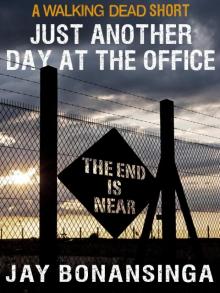 Just Another Day at the Office
Just Another Day at the Office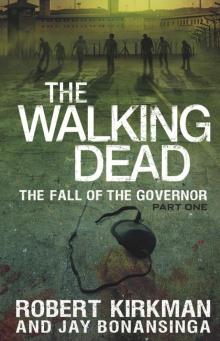 The Fall of the Governor: Part One
The Fall of the Governor: Part One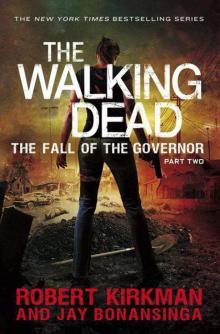 The Walking Dead: The Fall of the Governor: Part Two
The Walking Dead: The Fall of the Governor: Part Two Search and Destroy
Search and Destroy Invasion
Invasion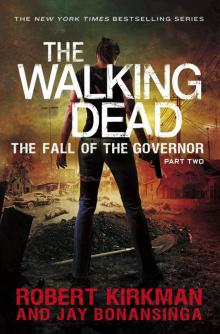 The Fall of the Governor: Part Two
The Fall of the Governor: Part Two The Walking Dead Collection
The Walking Dead Collection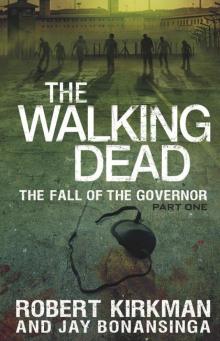 The Walking Dead
The Walking Dead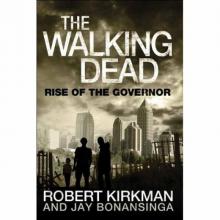 Descent
Descent The Walking Dead: Return to Woodbury
The Walking Dead: Return to Woodbury The Killer's Game
The Killer's Game Frozen
Frozen Shattered
Shattered The Sleep Police
The Sleep Police Perfect Victim
Perfect Victim